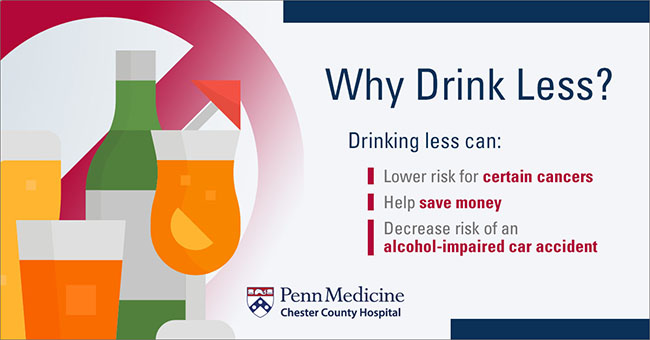
Rachel and her friends have a girls' night every Thursday at a local bar, and there's always drinking involved. After waking up with a hangover two Friday mornings in a row, Rachel realizes she doesn’t like the way drinking to excess makes her feel. The next week, she drinks ginger ale instead.
Jordan is preparing to run a 5k in their town. To train, they are going to the gym a couple of times a week and eating more fish and legumes. In the two months leading up to the race, Jordan decides that they also aren't going to drink alcohol.
Lawrence’s father has recently been diagnosed with colon cancer — and it may run in the family. After doing some research, Lawrence learns that drinking alcohol can increase his own risk. He decides that he is going to drink wine on special occasions only, instead of a few times a week.
You may have heard of Dry January or Sober October, where people decide not to drink any alcohol for a month, but many people are choosing to rethink their drinking habits year-round. All three of these situations are possible reasons someone might consider drinking less — and they’re all examples of people who are sober curious. But what does sober curious really mean?
Rise of the Sober Curious Movement
Being sober curious is not the same thing as sobriety.
If you have chosen sobriety, that means you don’t drink alcohol. Some people don’t drink alcohol for health reasons, and some don’t drink for religious reasons. Other people don’t drink because of their or their family’s experiences with addiction. And some people just don’t like drinking at all.
Being sober curious, on the other hand, doesn’t necessarily mean that you never drink alcohol. It simply means that you think and reflect more on why, when and how you drink alcohol — it's being curious about sobriety.
The results of being sober curious will look a little different for everyone. Think about the three different stories from the beginning of this blog. Each person had a reason for thinking about their own drinking habits, and each person came to their own choice about how they might change their behaviors permanently or just for a specific period of time.
Reflecting on Your Drinking Habits
April is Alcohol Awareness Month, and you may find yourself thinking more about how much you drink or why you drink. Sometimes, your sober curious journey can start with just the reminder that there are other options besides drinking — and that drinking less can benefit many aspects of your life and overall health.

Just because alcohol seems to be everywhere — and drinking is often seen as just another part of life — doesn't mean it's the only way to spend time with friends or unwind.\
If you're sober curious, it can be helpful to answer some questions about your drinking habits, like:
- How many times do you drink per week?
- How much alcohol do you typically drink in one setting?
- In what kinds of places or situations do you find yourself drinking (at home, at the bar, at a party)?
- What time of day do you tend to drink (at dinner, right after work, right before bed, at brunch)?
- Why do you drink (because you like the taste, because it helps you relax, because it’s just what people do)?
When reflecting on these questions, pay attention to how you feel about your answers. For example, are you unhappy about how many times per week you drink? Do you wish you had another activity to do to help you relax at the end of the day? Are you just drinking because you go to places where drinking is expected?
Answering these questions can help you decide if and how you may want to change your drinking patterns.
Different Ways to Be Sober Curious
If you think that you may be sober curious, or want to try something new, there are many different ways you can approach your own sober curiosity.
After reflecting, if you want to change your drinking habits, you can:
- Choose to only drink on certain days of the week or certain occasions
- Set a specific number of drinks for the times you do drink
- Try ordering a mocktail at the bar instead of an alcoholic beverage
- Stop drinking entirely for a certain period of time
- Use an online tool like the CDC’s change plan to figure out your goals
For some people, being sober curious and just changing their drinking habits isn’t enough. "If you or your family has a history of alcoholism, any amount of alcohol can have a huge impact on your mental health, safety, or your relationships with other people," says Jennifer Keah, MD, Primary Care physician at Chester County Hospital. "Sober curiosity can be an important tool for many people, but if you are struggling with addiction, you may need more support or treatment than just changing how much or how often you drink."
Whether you want to stop drinking altogether or are just interested in how you can change your own drinking patterns, the sober curious movement can be beneficial. Even just taking time to think about your current drinking is a great step in the right direction and can help you live a better, healthier life.
Are you sober curious? Talk to your Chester County Hospital primary care provider about how you can change your drinking habits today.
Related Information from Chester County Hospital: